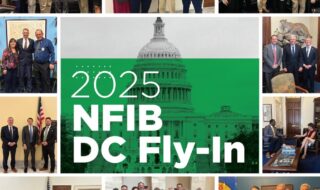Topics:
NFIB Inflation Survey: Large Majority of Small Business Owners Report Inflation Pressures Worsening
NFIB Inflation Survey: Large Majority of Small Business Owners Report Inflation Pressures Worsening
July 19, 2022
NFIB Inflation Survey: Large Majority of Small Business Owners Report Inflation Pressures Worsening
- Over three-quarters (79%) of small employers reported that rising “fuel (gasoline, diesel, fuel oil, etc.)” prices are a substantial contributor to higher costs.
- Seventy-two percent of small employers reported “inventory, supplies, and materials” as being a substantial contributor to higher costs.
- Under a third (31%) of small employers reported “labor” being a substantial contributor to higher costs.
- Four percent of employers report “rent” being a substantial contributor.
- Eighty-six percent of small employers are increasing the prices of their goods or services. Of those increasing prices, 7% reported that the effort was absorbing all their total cost increases, 36% reported most, about half (47%) reported some, and 9% reported a little.
- Eighty-two percent of small employers absorb costs through lower business earnings to some degree. Nine percent reported this absorbing all their total cost increases, 28% most, 50% some, and 11% a little.
- Less than a fifth (17%) of small employers have reduced the quantity of materials or goods used to produce final product(s) to absorb higher costs. Seven percent reported this absorbing all their total cost increase, 23% most, 52% some, and 15% a little.
- Twenty-three percent of employers switched to lower cost materials or goods (inventory, supplies, etc.) to produce final product(s) and services, with 4% reporting this absorbing all total costs.
- Twenty-nine percent of small employers are taking on debt to finance higher costs with 9% reporting it is absorbing all total cost increases.
- Thirty-one percent of small employers are reducing employee related costs, such as compensation, number of employees, hours worked, etc. Nine percent of owners reported that this covered all the cost increase, 11% reported most, 62% some, and 18% a little.
- Seventy percent of small employers are planning to raise average selling prices in the next three months and 17% were not sure.
- Thirty-eight percent reported they would raise prices by 10% or more and about half (44%) reported 4-9%.
- Almost three-quarters (71%) of small employers raised their average selling prices in the last three months.
- Another three-quarters (73%) of owners reported assessing the adequacy of their price levels of the goods or services they provide more frequently than twice a year. Thirty-three percent reported assessing price levels weekly, 23% monthly, and 17% every few months.
- About half (45%) of small employers have contracts with customers with fixed price agreements.
- Nearly all (96%) of small employers reported higher gas and fuel prices have some degree of a negative impact on their business.
- Forty-one percent of small employers characterized the cost of energy used in their business (electricity, natural gas, gasoline, and fuel oil) as one of the five largest business costs they have.
- About a quarter (28%) reported it being one of the two or three largest business costs they have and 6% reported it being the single largest business costs in their business.
- When asked what activities business energy costs are primarily linked to, about a quarter (26%) said heating and/or cooling. Four percent said lighting, 37% said operating vehicles, 29% said operating equipment and/or processes, and 4% said “other.”
- About three-quarters (77%) of small employers reported that delivery services are being impacted by higher gas and fuel prices. Seventy-two percent reported commuting to/from work, and another 71% reported employee travel for work purposes. Sixty-three percent reported equipment operation, and 62% reported other vehicle use.
- Almost all (96%) of small employers reported supply chain disruptions having some degree of impact on their business.
- A little over half (56%) reported being unable to acquire a key input needed to produce a good and service offered to their customers in the last six months.
- Sixty-seven percent of owners reported that higher interest rates are having some degree of a negative impact on their business.
- Thirty-four percent reported higher interest rates impacting their business by increasing the cost of financing. Fourteen percent said increasing the cost of financing for their customers, 42% responded slowing general consumer spending, and 5% responded reducing financing options.
- When asked if they anticipate that higher interest rates will slow down consumer spending over the next six months, 43% responded significant slowdown, 39% moderate slowdown, and 14% mild slowdown.
Get to know NFIB
NFIB is a member-driven organization advocating on behalf of small and independent businesses nationwide.
Related Articles

July 2, 2025
NFIB Key Votes One Big Beautiful Bill Act in U.S. Senate and Ho…
NFIB key votes the One Big Beautiful Bill Act in the 119th Congress and urg…
Read More


July 2, 2025
Small Business Owners Push Priorities in Capitol Hill Meetings
Over 80 small business owners attended NFIB’s annual Fly-In. They attende…
Read More



July 2, 2025
Small Business Owner Testifies Before U.S. House Committee on W…
Virginia NFIB member and small business owner Joshua Phelps spoke to the U….
Read More







